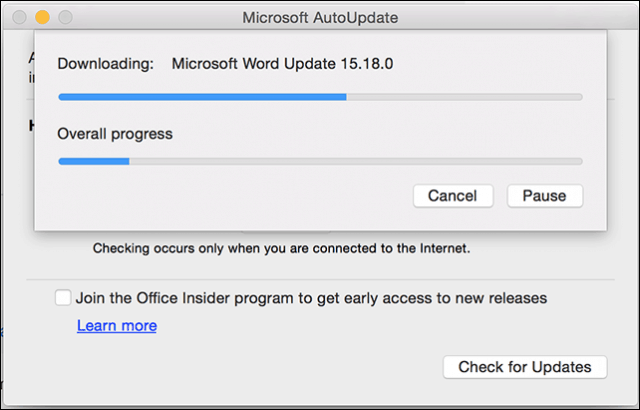Microsoft Autoupdate For Mac Not Working 4,8/5 2300 reviews
AutoUpdate 3.0.5 was installed with the last Office update a few days ago. Microsoft has backed off from the mess it made with a new version of AutoUpdate you can download now. The problem only happens if you're using both the Office 2016 preview Microsoft has posted as well as Office 2011.
- Microsoft Autoupdate For Mac Not Working On Mac
- Microsoft Update Site
- Office Autoupdate
- How To Update Mac
- Update Microsoft
Microsoft Autoupdate For Mac Not Working On Mac
This update to Microsoft AutoUpdate for Mac is part of Microsoft's continued effort to provide the latest product updates to customers. To receive future product updates, you must install this update. Mar 19, 2020 The latest version as of 04/19/18 is AutoUpdate 3.18. Once installed it downloaded a version of Office 2011 that is not yet pasted on MacUpdate: 1477. Which is cool, considering that Microsoft has supposedly discontinued support for Office 2011. Of course all it contained were security fixes. But that's not bad news.
Once you installed the previous version of AutoUpdate, you'd find that it would locate but would be unable to install an update to Office 2011. What's worse, the AutoUpdate program would grab lots of memory and generally make a mess of things. People were running into this problem:
To get past it, the easiest thing to do is to to run AutoUpdate again. It'll find the updated version of itself and install it. To do so, just select the 'Check for Updates' option in the Help menu of any open Microsoft application.
If that doesn't work, or if you don't trust AutoUpdate to do the right thing, you can download the latest updater from Microsoft's web site and install it yourself. That'll download to your Downloads folder as a .pkg file.
How to run the AutoUpdate installer
Microsoft Update Site
- Double-click on 'Microsoft AutoUpdate 3.0.6.pkg' to launch the installer.
- Click Continue.
- Click Continue again to install it to your Mac's hard drive.
- Click Install.
- Enter your administrator password and click Install Software.
- After it's done click the Close button.
That's it.
We may earn a commission for purchases using our links. Learn more.
Scene setter'Home Before Dark' production designer talks sets, location, and more
'Home Before Dark' is now on Apple TV+ and the show's production designer has been talking about how it all went down.
The Microsoft Office for Mac Team is on a roll and bring new features for the new year. One of the cool new features is Full-Screen View for Outlook.
The Office for Mac Team is on a roll, ringing in the New Year with new features for the 2016 revision launched in mid-2015. One of the neat new features is Full-Screen View support in Outlook 2016 for Mac. It’s a native feature of OS X, but some programs have taken a bit of time to catch up. Now that it has arrived in Outlook with the new updates, here’s a look at how to use it and what to expect.
Activate Full-Screen View in Outlook 2016 for Mac
First, you need to ensure you have the latest updates for Office 2016 installed. Check out our article for instructions about the new updates and how you can get them. Once you have those updates installed, launch Outlook 2016 for Mac. Then maximize the window to get the full-screen view feature.
Full screen is more than just an immersive experience. When you open a message background distractions are removed placing a clear focus on the content. When you want to exit focus view, just click outside the message window, to return to the main Outlook screen.
You can also multi-task, when in full-screen view. To display more than one message at a time, open a message, then minimize it. Open another message, and then click the message tab for the message you had previously minimized.

Outlook 2016 will automatically split the screen between both messages.
I initially experienced difficulty activating focus view with two messages on the screen. It turns out if your Mac uses a default resolution 1440 x 900, it will instead toggle the messages. If you happen to own a Mac with a Retina display, do the following: Open System Preferences then click Display
Office Autoupdate
Select the Scaled radio box then click the third option. Do note, this might limit the performance of your Mac. I find it really strange I had to do this to get the feature working in Outlook 2016 for Mac.
How To Update Mac
OS X El Capitan Split View Support
Outlook 2016 for Mac also takes advantage of the new OS X El Capitan feature, Split View. This one calls for an even higher resolution, minimum 1550 pixels. To activate it, click File > New > Main window. Split View with Outlook 2016, lets you set up an additional main window, which you can use for managing your calendar, tasks or another inbox. I could not get it to work because of the limitation of my resolution.
Split View with Outlook 2016, lets you set up an additional main window, which you can use for managing your calendar, tasks or another inbox. I could not get it to work because of the limitation of my resolution.
Update Microsoft
The Outlook for Mac Team notes these are early days; more work is being done to refine the feature. Hopefully, we will see better support for older Macs with lower resolution. Let us know what you think of the new feature.
/cdn.vox-cdn.com/uploads/chorus_asset/file/9468933/outlookformac.png)